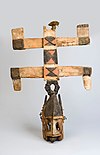Portal:Pan-Africanism/Selected history/11
| Part of a series on |
| Traditional African religions |
|---|
 |
Traditional African religions have faced persecution from the proponents of different ideologies. Adherents of these religions have been forcefully converted to Islam and Christianity, demonized and marginalized. The atrocities include killings, waging war, destroying of sacred places, and other atrocious actions.
After the establishment of Islam, its rapid expansion and conquests displaced traditional African religions either by conversion or conquest. Traditional African religions have influenced Islam in Africa, and Islam is considered as having more commonality with traditional African religions, but conflict has occurred, especially due to Islam's monotheistic stance and the rise of Muslim reformers such as Askia.
In the Senegambia region, the Serer people who held "a strong connection to their ancient religious past" became the targets of Islamic jihads and persecution from the 11th to the 19th-century resulting in the Battle of Fandane-Thiouthioune.
Traditional African religions are tolerant of other gods, which allows general co-existence for multiple religions. This has been regarded by some authors to be another reason behind the rise of other religions in Africa. Most followers of traditional religions accommodated Islam during the start of its spread in Africa, but in West Africa, it was not until the coming of colonialism that Islam gained mass appeal, transforming even groups with historical animosity towards Islamic domination into Muslim communities.
In many instances, conflicting groups chose to align with Muslim armies against other African communities.
| “ | ...during the nineteenth century, Christian missionaries became active in Africa and Oceania. Attempts by Christian missionaries to convert nonbelievers to Christianity took two main forms: forced conversions and proselytizing. | ” |
| — Garrick Bailey, James Peoples , — Bailey, Garrick; Peoples, James, Essentials of Cultural Anthropology, 3rd ed. Cengage Learning (2013), p. 268, ISBN 9781133603566 [1] | ||
| “ | The role of Christian missionaries are a private interest group in European colonial occupation of Africa was a significant one...Collectively their activities promoted division within traditional African societies into rival factions...the picture denigrated African culture and religion... | ” |
| — Festus Ugboaja Ohaegbulam , — Ohaegbulam, Festus Ugboaja, Towards an Understanding of the African Experience from Historical and Contemporary Perspectives, University Press of America (1990), p. 161, ISBN 9780819179418 [2] | ||
| “ | A religion of Middle Eastern origin, Islam reached Africa via the northern region of the continent by means of conquest. The Islamic wars of conquest that would lead to the Islamization of North Africa occurred first in Egypt, when in about 642 CE the country fell to the invading Muslim forces from Arabia. Over the next centuries, the rest of the Maghreb would succumb to Jihadist armies...The notion of religion conversion, whether by force or peaceful means, is foreign to indigenous African beliefs...Islam, however, did not become a religion of the masses by peaceful means. Forced conversion was an indispensable element of proselytization. | ” |
| — Toyin Falola, Adebayo Oyebade , — Falola, Toyin; Oyebade, Adebayo, Hot Spot: Sub-Saharan Africa, ABC-CLIO (2010), p. 7, ISBN 9780313359712 [3] | ||
| “ | African traditional religion went through and survived this type of persecution at the hands of Christianity and Islam... | ” |
| — Darrol M. Bryant, Rita H. Mataragnon, — Bryant, M. Darrol; Mataragnon, Rita H., (cont. M. Darrol Bryant), The Many faces of religion and society, Paragon House Publishers (1985), p. 100, ISBN 9780913757208 | ||
